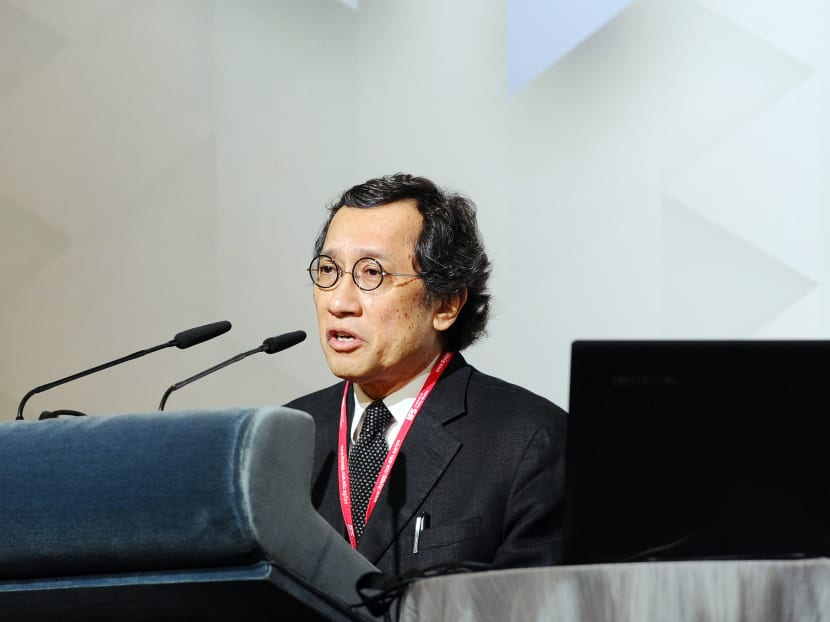S’pore’s foreign policy ‘must be nimble’ as US-China relations evolve
SINGAPORE — The United States-China relationship will continue to be the central pillar of an emerging East Asian regional architecture, and as the two major powers seek to arrive at a new modus vivendi, it is important for small states such as Singapore to pursue a nimble and clinical foreign policy so as to maximise the country’s autonomy, said Mr Bilahari Kausikan, Ambassador-at-Large and policy adviser at the Ministry of Foreign Affairs today (July 3).

The United States-China relationship will continue to be the central pillar of an emerging East Asian regional architecture said Mr Bilahari Kausikan, Ambassador-at-Large and Ministry of Foreign Affairs Policy Adviser today (July 3). Photo: IPS
SINGAPORE — The United States-China relationship will continue to be the central pillar of an emerging East Asian regional architecture, and as the two major powers seek to arrive at a new modus vivendi, it is important for small states such as Singapore to pursue a nimble and clinical foreign policy so as to maximise the country’s autonomy, said Mr Bilahari Kausikan, Ambassador-at-Large and policy adviser at the Ministry of Foreign Affairs today (July 3).
Speaking in a panel discussion entitled Geopolitics: Preparing for Multipolarity, Mr Kausikan, as well as Professor Jia Qingguo, dean of Peking University’s School of International Studies, agreed that talk of a multipolar world was premature, as the US-China relationship would continue to define the strategic complexion of the region.
The discussion was held in conjuction with a conference, Singapore at 50: What Lies Ahead, organised by the Institute of Policy Studies.
Mr Kausikan said that as the process of adjustment takes place between the major powers, “the challenge for Singa-pore, as for all other countries in East Asia, is to position ourselves so as to preserve maximum autonomy and avoid being forced into invidious choices”.
“We are now in a sweet spot, as far as our relations with major powers are concerned. If we mess it up, we have only ourselves to blame,” he said.
In order for Singapore to continue being successful in this exercise, Mr Kausikan said it was important for the Republic to do three things. They are: Accurately understand the dynamics between Washington and Beijing; pursue the country’s interests in a nimble and nuanced manner; and maintain the centrality of the Association of South-east Asian Nations in the regional architecture.
However, Mr Kausikan, who was a Permanent Secretary at the Foreign Ministry, also highlighted three factors in the domestic sphere that could negatively affect Singapore’s foreign policy.
First, partisan domestic politics may complicate foreign policy. As an example, he cited his belief that a particular opposition party here had once attempted to use Singapore’s policy towards the Middle East and relationship with its neighbours to the party’s own political advantage.
Second, as Singapore’s political landscape becomes more pluralistic, the opportunities for foreign interference in the country’s foreign policy will also multiply.
“No matter how fervently they may swear otherwise, major powers are always going to compete for influence in our domestic space so as to influence our foreign policy,” he said, and Singaporeans may become unwitting collaborators.
Lastly, the civil service needs to understand that foreign policy cannot be the sole responsibility of the Foreign Ministry or Singapore’s top leaders.
Mr Kausikan explained that “the accumulation of small actions across a wide policy domain by domestic actors” will ultimately affect broader foreign-policy interests.
Prof Jia pointed out that though China had overtaken the US in terms of gross domestic product, the latter’s lead in political influence, economic efficiency, scientific innovation and military capability is likely to remain significant for a long time.
He said Beijing is likely to avoid confrontation and enhance cooperation with Washington. “Those who advocate confrontation and conflict (with the US) are out of their minds,” he added.
During the question-and-answer session, Prof Tommy Koh, Ambassador-at-Large at the Foreign Ministry, asked if China had abandoned former leader Deng Xiaoping’s foreign-policy maxim of “hiding brightness and nourishing obscurity”, as some analysts believe.
Prof Jia explained that while Beijing had not officially abandoned the maxim, it has been “overtaken by reality”. He said China could no longer keep a low profile, as its policy interests have now taken on a global dimension. “Beijing has no alternative but to be more proactive,” he said.
The professor also offered a glimpse into the Chinese foreign-policy psyche, saying that Beijing often adopted “two identities on many fronts”, which translates into a whole range of contradictions in diplomatic behaviour.
He explained that China was simultaneously a developing and a developed country, as well as a poor and a rich country. It is also a strong country — in military terms, and weak country — in not wanting to be a target for international intervention.
He said that Beijing finds it increasingly difficult to define its interests and behave in a consistent way, both internally and externally, and all this is happening when the outside world is anxious to gauge its intentions.
“But the problem is that (the outside world is) bound to be disappointed,” said Prof Jia, adding that the Chinese themselves cannot agree on what they want.






